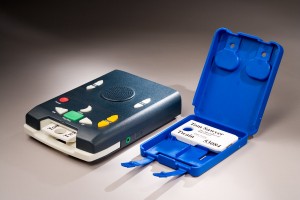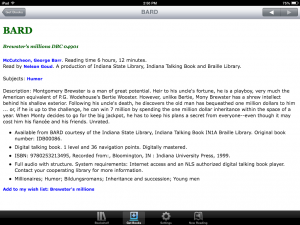Recently, the Indiana State Library named Carl W. Henn, Jr. volunteer of the year for his work as a narrator for the Talking Book and Braille Library’s Indiana Voices program, a program which records audio books for blind and visually disabled citizens of the state. Mr. Henn, who is 93, has been volunteering as a reader for both the Indiana State Library and the Indiana Historical Society for over 35 years.
During WWII, Mr. Henn served as member of General George S. Patton’s headquarters band. He worked for many years afterward in a variety of capacities at the Indianapolis Times newspapers, as well as for Eli Lilly & Company, the Indianapolis Chamber of Commerce, and Philharmonic Orchestra of Indianapolis.
While working as a volunteer for the Indiana Voices program, Mr. Henn has narrated approximately 20 audio books. He enjoys reading both fiction titles as well as books that are highly informative in nature. He also shared that his reason for being a part of the Indiana Voices program is to fulfill an obvious need by making use of his capabilities.

To learn more about the Indiana Voices program, including volunteer opportunities, please visit http://www.in.gov/library/2399.htm.
This blog post was written by Margaret Ansty, Talking Book & Braille Library Supervisor, Indiana State Library. For more information, contact the Indiana State Library at (317)232-3684 or “Ask-A-Librarian” at http://www.in.gov/library/ask.htm.


